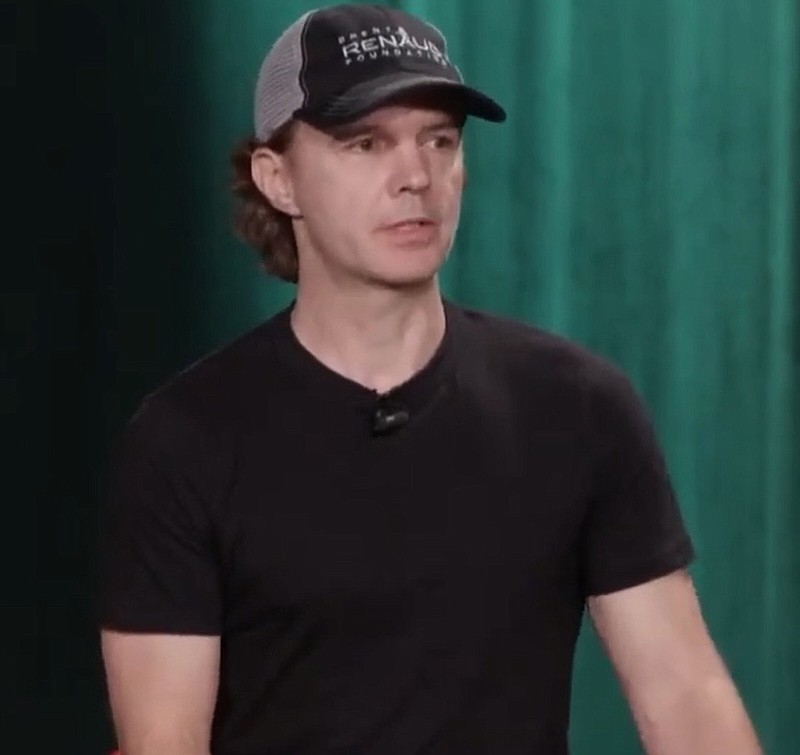Last month, the Brent Renaud Foundation hosted its first of what promises to be many events at the Arkansas PBS studios in Conway. Teenagers, parents, and young filmmakers were invited to have a two-hour conversation with award-winning documentarian Craig Renaud ("Off to War," "Little Rock Central: 50 Years Later"), photojournalist Juan Arredondo, and filmmakers Jamal Hodge ("Primal Instinct") and Amman Abbasi ("Dayveon").
Attendees were first ushered down the winding labyrinth-style corridors that are the PBS offices until we were led to the main studio, the same studio that is home to "Blueberry's Clubhouse" and "Rise and Shine." As we entered, we were greeted by the entire Renaud family: Brent's brother Craig, his mother, and his sister. Each one humbly handing out refreshments and goodie bags, and making small talk with each and every person until the show started.
After everyone was seated, and once the livestream of the event started, the four filmmakers took the stage and immediately opened the floor to questions, taking the audience by surprise. The first questions came from high school students as they wanted to know how they could become filmmakers or even if they should get into filmmaking. All four artists had basically the same response: If you have a story to tell, if you want to tell other people's stories, then yes, become a filmmaker. As to the how, this required a more nuanced answer, as there's no one track to becoming an artist; in fact, all four of these artists had drastically different career paths.
None of them attended film school, and they were all adamant about not needing a formal education to become a filmmaker. All you need is some equipment and some like-minded friends to work as your crew, and there you have the beginnings of a film career. Brent and Craig Renaud both received college degrees in English and anthropology, respectively. They didn't get into filmmaking until they met cinema verite documentarian Jon Alpert at the Downtown Community Television Center (DCTV) in New York. The brothers interned at DCTV, where they learned and honed their craft as documentarians. And over the past two decades they were both honored by the Peabody Awards, the Emmys, IDA, the Overseas Press Club, the duPont Columbia Awards and the Edward R. Murrow Awards for covering a variety of worldwide humanitarian issues ranging from the wars in Iraq and Afghanistan to the drug and refugee crisis across the Mexican border.
Juan Arredondo's advice to the young filmmakers is that you're never too old to start your journey into the arts. Arredondo had already graduated and was working in the pharmaceutical field before he had the opportunity to realize his passion for photojournalism. He would use his vacation time to chronicle human rights violations and conflict in Colombia, Venezuela, and Central America. In the midst of his reporting he would find himself in dangerous situations, sometimes receiving beatings from foreign law enforcement. He even found himself in the Ukraine alongside Brent as they were attacked. (Brent was killed in Ukraine in March).
Hodge and Abbasi were both mentored by Brent and Craig relatively early in their careers. Hodge met the Renauds in New York, where he claimed that they were his first white friends and changed his perspective on society. His advice for these teens was that film is a communal art and that they need to "grow with other artists while you discover your own voice." But he also suggested that people need to learn the business side of the art world, that if you're going to raise money for a project, look to communities outside of your own. Abbasi, on the other hand, was a high school student when he met the Renauds. They were filming their documentary about Little Rock Central High School, and Abbasi would go up to the brothers every day and "bug" them with all sorts of filmmaking questions until they took him under their wings as a fledgling filmmaker.
The filmmakers spent the rest of the event telling their own personal stories and fielding questions from the high school students, giving them the confidence that becoming a filmmaker is achievable, and they even took questions from the parents in the crowd and reassured them that their child can indeed make a living as an artist, no matter how rough things can get. All they need to do is to support and help nurture their child's artistic ambitions.
After the event, I sat down with Craig to ask him about the foundation and its mentors, but our conversation took an unexpected turn. He's a very soft-spoken man, but comes off endearing and passionate in his word choices. He told me that he wanted the foundation to focus in part on mental health. Honestly, at first, I didn't really see the connection between mental health and mentoring teenage filmmakers. But then he told me about the struggles that he and Arredondo have had since the incident in Ukraine. Not only that, but Craig asked me about my mental health, and as I started talking, I realized that the past few years, as a filmmaker, I've had a pretty rough time with my own films and employment and just general stress. And as I was talking, I looked at Craig and realized that he was listening ... really listening. I got choked up at the sobering thought that as an artist, as a filmmaker, I have put my own mental health on the back burner for way too long. And it was nice to just have someone to talk to, even for the briefest of moments.
The Brent Renaud Foundation is planning more of these town hall-style events, and they will be launching their website soon, brentrenaudfoundation.org. But in the meantime you can watch this two-hour conversation at the Arkansas PBS YouTube page.
